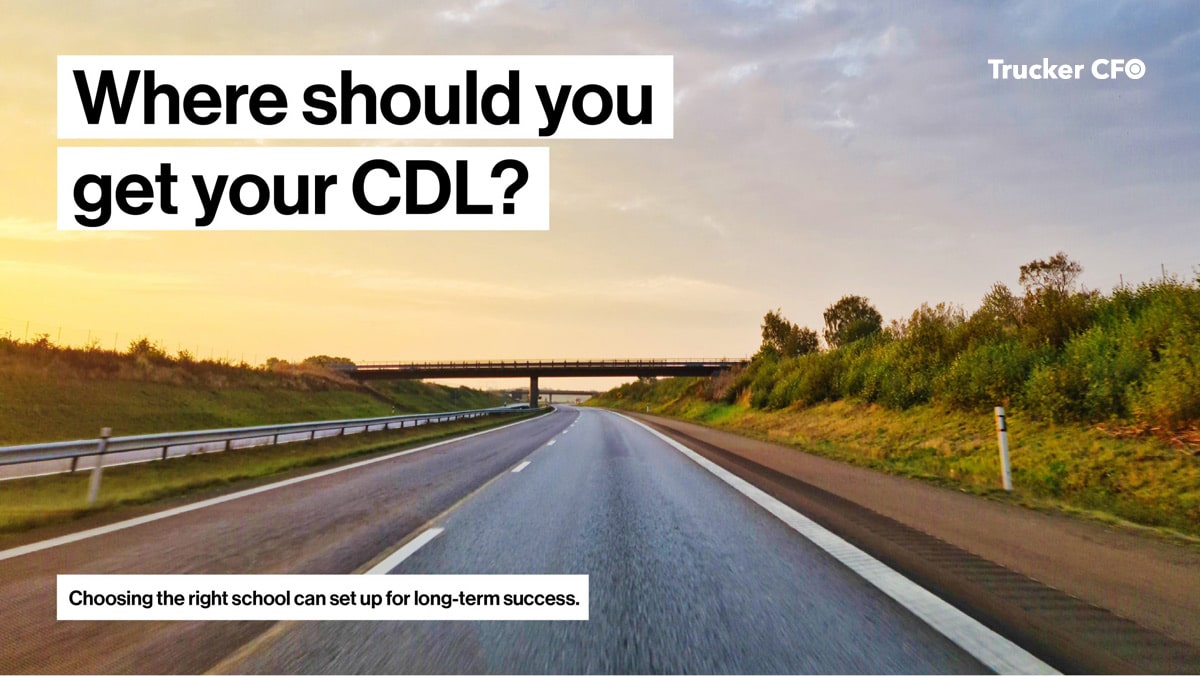
Recently, we talked about the importance of having a plan before jumping into the owner-operator’s seat. Today, we’re going to dive in a little bit deeper about getting your CDL and a few things you need to take into consideration when doing your research.
Not all operations are going to require you to have that CDL, but most will. As well, not all schools are created equally. Just because one school is cheaper or more conveniently located than another does not make it the right one for you. It’s extremely important to do your due diligence and make sure you understand what you are getting into before you get started.
There are three main places that you can go to obtain a commercial driver’s license:
- Private trucking schools
- Public trucking schools
- Motor-carrier trucking schools
Private Trucking Schools
Oftentimes, private trucking schools are going to be the most expensive option. But, on the positive side, you’re going to get through those operations quickly. Also, you’re going to have more one-on-one instruction, and you’ll have generally better equipment to be training with through private trucking schools.
Some Private CDL schools will require that drivers pay upfront for tuition. Many companies will offer tuition reimbursement to recent graduates, but the initial expense is the responsibility of the student.
Students will generally be attending school near their home, at either a stand-alone school or through the many CDL training programs offered through local community colleges and technical schools.
Students also need to make sure that the school meets certain training standards, as many states and companies will require a minimum number of hours of schooling, or require schools to be accredited or certified.
Public Trucking Schools
Quite often, public trucking schools can be found through local community colleges. In those situations, they are less expensive, but they take more time.
However, from a price perspective, you could possibly qualify for grants, scholarships, and student loans which would give you the ability to attend, even if you couldn’t afford to pay for tuition upfront.
On the downside, the equipment you would learn on would not be as nice or new as what you would get in a private or motor-carrier trucking school. Finally, another negative aspect of a public trucking school is you are likely to see a less favorable student to teacher ratio. In a private or motor-carrier trucking school, the instructors will likely have fewer students, giving you more 1:1 instruction. This is especially important while getting road time on the range.
Motor-carrier Trucking Schools
Trucking schools offered through motor carriers provide another option for obtaining your CDL. Typically, the schools offered through a motor carrier will allow you to obtain your CDL fairly quickly and this option is usually on the inexpensive side, if not free.
These schools also tend to move quickly and those not able to keep up won’t graduate. This might be an issue for you when compared to a public or private school where you are almost guaranteed to get your CDL unless you quit the program.
Finally, one very important consideration is that getting your initial training and earning your CDL through a school affiliated with a motor carrier will typically require you to sign a contract that has you driving for some period of time for that motor carrier as potentially an independent contractor or a company driver with that motor carrier. You will not get the same choices upon graduation as you would if you went the public or private school route.
Whatever you choose, weigh the pros and cons first and make the decision that lines up best with your needs and plan.
Additional Considerations
As you weigh out your options, below are just a few of the questions that you should research when choosing a trucking school. This isn’t meant to be an exhaustive list and there are obviously going to be factors unique to your situation, but this is a great place to start.
- Price
- How much are you willing to spend on trucking school?
- Will you be able to get reimbursed for driving school tuition?
- Do you have to pay upfront or when I graduate from driving school?
- What else am you agreeing to by attending?
- Quality
- How long has the trucking school been around?
- How much driving time is required to graduate?
- What certifications does the school have?
- How many students does each instructor teach at any one time?
- Are the instructors experienced truckers and qualified teachers?
- What kind of reputation does the trucking school have with veteran drivers?
- Job Placement
- Will you have or be able to get a job once you graduate?
- If necessary, is the trucking school going to help you find work?
- Are you signing a contract to work upon graduation?
- What kind of network does the trucking school have with recruiters?
- Your Location
- How far are you willing to commute to trucking school?
- Is your CDL transferable to another state?
- Does your state have different requirements?
Wrap Up
To conclude, it’s extremely important to do your research and make sure you understand both the long and short-term implications of choosing a trucker school. Also, remember that is the first step in your master plan and this decision may impact others, which is why we always tell our clients to envision how their trucking career looks down the road.
Over the last 15 years, we’ve had the opportunity to acquire the experience necessary to help you make this master plan and show you the potholes you can avoid to make your life as an owner-operator as smooth as possible. If you have questions and would like to know more about the services we provide through the Trucker CFO, please send us an email, info@truckercfo.com.
